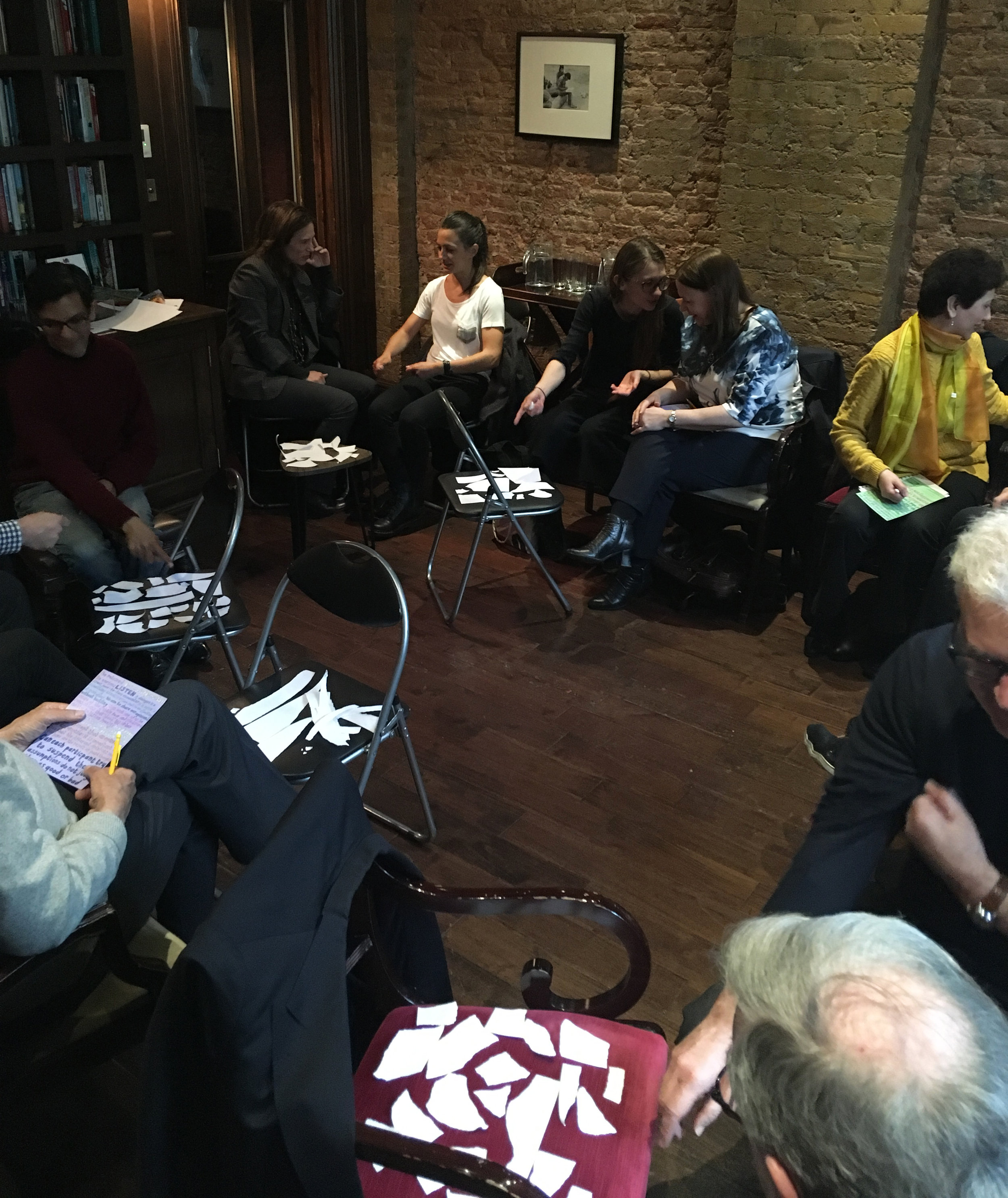Last night was the second in the series of four dialogues I am facilitating for the UK Values Alliance. Following on from the first dialogue exploring Values & The Self, last night we met and took time to consider Values & Others.
After a brief check-in and mindfulness exercise I asked the participants to find a pair for the paper tear exercise. After silently taking turns to tear the paper, I gave them two minutes to write values that are important to them on the pieces of paper, and once again place them down in front of their partner. A lively ten minute discussion followed, as the pairs discussed why they had chosen those values and compared meaning of any shared values.
After this quick warm-up we entered into the dialogue. Following on from the exercise people commented on how they found that even if they had the same word as their partner, they did not necessarily share the same meaning of that word. This highlights the sometimes limiting nature of human language to express and put into words something that is often felt and sensed in our bodies before it is 'thought' in our minds. The value of beauty was an example of varied meanings from the group; from nature, to mathematical equations, to chaos, to every human being as beautiful.
This led on to an exploration of whether we act out our values unconsciously, or consciously. If we take time to consciously consider our values and become more aware of them, might this in turn affect our consideration of other people's values. This also requires an understanding of how conscious we are of our thought patterns, and the stories we tell ourselves about ourselves. It may be that we have different values or different meanings of the same value because we are all shaped by our experiences, and our experiences can create habitual thought patterns and learnt behaviour that can cloud our ability to meet people and situations with fresh thinking and non-judgement. Equally we all have an internal hierarchy of values, we all have different values and we prioritise them differently.
The example of litter was given as behaviour of others that is hard to understand and tolerate. Why would someone choose to litter our shared environment, and equally what drives others to pick it up when it is not theirs. This proved a very good example and raised two further points around the values of acceptance and understanding. Some felt that acceptance of the person who had littered was part of understanding the human condition; we are all doing the best we can, with what we have. Others raised concern that an acceptance of people dropping litter was parallel to doing nothing and becoming apathetic. For some acceptance means non-action, for others acceptance leads to action; for is it possible to encourage the person that litters to stop littering if we show them anger and aggression or if we meet them with acceptance and love.
This part of the dialogue was neatly summarised in the check-out by Alan, who discovered the need for understanding to understand what is driving the other person to litter.
'There can't be understanding, without understanding.'
The dialogue flowed to and from what it means to be human; are we inherently 'good' or 'bad'. What assumptions do we have about human nature and how that drives and shapes our different engagement with values both intellectually and emotionally. Does a more conscious awareness of our values give us the ability to see 'you in me' - what is in you in also in me, the equal capacity for 'good' and 'bad.'
One beautiful example was given of the sun that shines within all of us, covered by clouds that we put there through social conditioning and experience. Our values are the rays of sun shining out through the clouds, connecting us to each other, to our common nature and to the values within all of us that we all share.
'...the exercise, being in the present the power of the group,the support really makes it possible to go deeper and to connect, (with) what I still believe is common, all these values are common to all of us, they don't always get expressed, but they're there, available.'
We were given profound stories of forgiveness and empathy; to be able to pray for forgiveness of enemies, see the suffering in those that harm us and look past all the problems, listen without judgement but with love and ask the most relevant questions.
We also touched on the difference between community values and individual values. We had mostly spoken from the perspective of our individual values and how we use these to relate to and understand others and their values, but we did not explore the values that a community can share and act on together. The same applies to organisations looking to embody their company values.
Perhaps we find it harder to extend our thinking to community values because we give such little time and space to coming together to reflect, share and think. Being in dialogue with groups demonstrates how if we take time to pause, create stillness and space, we can begin to understand each others values, and the thinking and feelings behind them. For me it felt like we were sharing a dance of values and left me with the question of how we become more in rhythm with each other, the flow of life and our values in it.
'The part that I found most useful was in a group the way we are, there is a real openness, and that has allowed people to speak more from the heart not just the intellectual part.


